Ethics and Social Media: Applying Ethical Theories to Online Behavior
VerifiedAdded on 2020/05/28
|6
|1558
|207
Essay
AI Summary
This essay provides an in-depth analysis of the ethical considerations surrounding social media platforms. It begins by highlighting the significant role social media plays in contemporary society and then addresses the ethical issues raised by the CNBC article, "Social media platforms present dangerous issues for society. They need to be regulated." The paper evaluates these issues using various ethical theories, including utilitarianism, deontology, virtue ethics, and social contract theory. It explores how these theories apply to user behavior, content creation, and the overall impact of social media on individuals and society. The essay examines the positive and negative consequences of social media, such as its influence on politics, education, and business, and considers the perspectives of ethicists and technology philosophers. The paper concludes with recommendations for users, encouraging them to evaluate their posts and comments based on the ethical theories discussed.

Running Head: Ethics 1
Ethics
Ethics
Paraphrase This Document
Need a fresh take? Get an instant paraphrase of this document with our AI Paraphraser
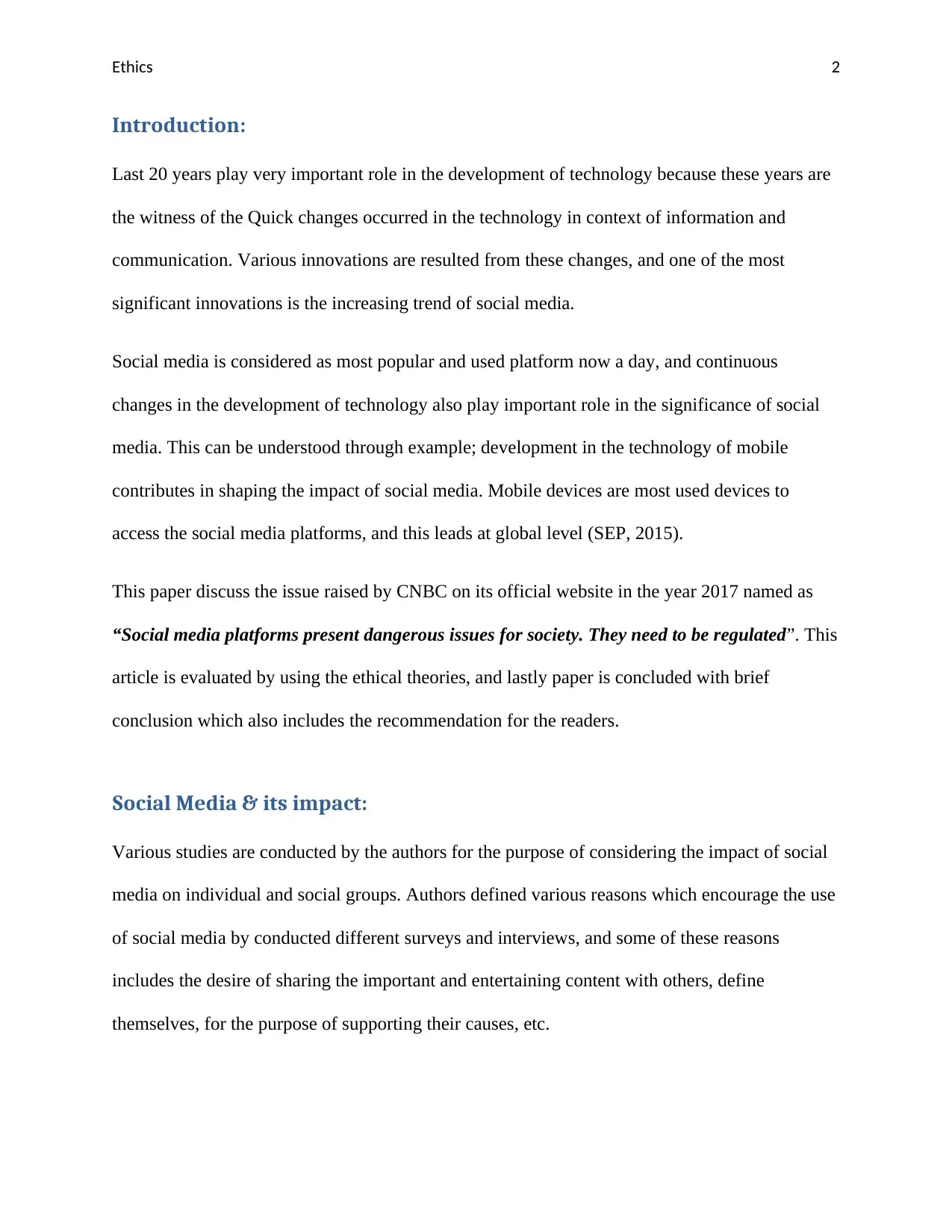
Ethics 2
Introduction:
Last 20 years play very important role in the development of technology because these years are
the witness of the Quick changes occurred in the technology in context of information and
communication. Various innovations are resulted from these changes, and one of the most
significant innovations is the increasing trend of social media.
Social media is considered as most popular and used platform now a day, and continuous
changes in the development of technology also play important role in the significance of social
media. This can be understood through example; development in the technology of mobile
contributes in shaping the impact of social media. Mobile devices are most used devices to
access the social media platforms, and this leads at global level (SEP, 2015).
This paper discuss the issue raised by CNBC on its official website in the year 2017 named as
“Social media platforms present dangerous issues for society. They need to be regulated”. This
article is evaluated by using the ethical theories, and lastly paper is concluded with brief
conclusion which also includes the recommendation for the readers.
Social Media & its impact:
Various studies are conducted by the authors for the purpose of considering the impact of social
media on individual and social groups. Authors defined various reasons which encourage the use
of social media by conducted different surveys and interviews, and some of these reasons
includes the desire of sharing the important and entertaining content with others, define
themselves, for the purpose of supporting their causes, etc.
Introduction:
Last 20 years play very important role in the development of technology because these years are
the witness of the Quick changes occurred in the technology in context of information and
communication. Various innovations are resulted from these changes, and one of the most
significant innovations is the increasing trend of social media.
Social media is considered as most popular and used platform now a day, and continuous
changes in the development of technology also play important role in the significance of social
media. This can be understood through example; development in the technology of mobile
contributes in shaping the impact of social media. Mobile devices are most used devices to
access the social media platforms, and this leads at global level (SEP, 2015).
This paper discuss the issue raised by CNBC on its official website in the year 2017 named as
“Social media platforms present dangerous issues for society. They need to be regulated”. This
article is evaluated by using the ethical theories, and lastly paper is concluded with brief
conclusion which also includes the recommendation for the readers.
Social Media & its impact:
Various studies are conducted by the authors for the purpose of considering the impact of social
media on individual and social groups. Authors defined various reasons which encourage the use
of social media by conducted different surveys and interviews, and some of these reasons
includes the desire of sharing the important and entertaining content with others, define
themselves, for the purpose of supporting their causes, etc.
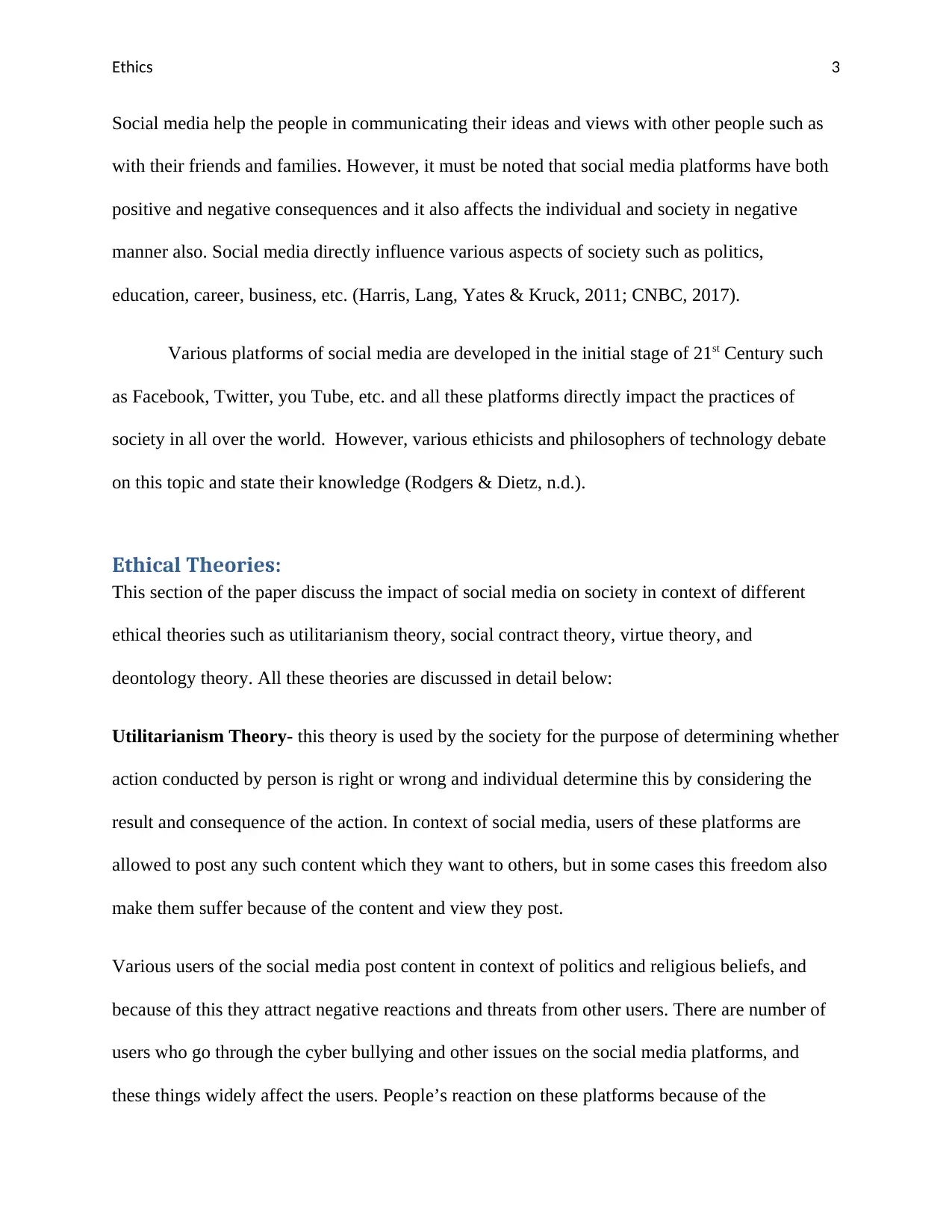
Ethics 3
Social media help the people in communicating their ideas and views with other people such as
with their friends and families. However, it must be noted that social media platforms have both
positive and negative consequences and it also affects the individual and society in negative
manner also. Social media directly influence various aspects of society such as politics,
education, career, business, etc. (Harris, Lang, Yates & Kruck, 2011; CNBC, 2017).
Various platforms of social media are developed in the initial stage of 21st Century such
as Facebook, Twitter, you Tube, etc. and all these platforms directly impact the practices of
society in all over the world. However, various ethicists and philosophers of technology debate
on this topic and state their knowledge (Rodgers & Dietz, n.d.).
Ethical Theories:
This section of the paper discuss the impact of social media on society in context of different
ethical theories such as utilitarianism theory, social contract theory, virtue theory, and
deontology theory. All these theories are discussed in detail below:
Utilitarianism Theory- this theory is used by the society for the purpose of determining whether
action conducted by person is right or wrong and individual determine this by considering the
result and consequence of the action. In context of social media, users of these platforms are
allowed to post any such content which they want to others, but in some cases this freedom also
make them suffer because of the content and view they post.
Various users of the social media post content in context of politics and religious beliefs, and
because of this they attract negative reactions and threats from other users. There are number of
users who go through the cyber bullying and other issues on the social media platforms, and
these things widely affect the users. People’s reaction on these platforms because of the
Social media help the people in communicating their ideas and views with other people such as
with their friends and families. However, it must be noted that social media platforms have both
positive and negative consequences and it also affects the individual and society in negative
manner also. Social media directly influence various aspects of society such as politics,
education, career, business, etc. (Harris, Lang, Yates & Kruck, 2011; CNBC, 2017).
Various platforms of social media are developed in the initial stage of 21st Century such
as Facebook, Twitter, you Tube, etc. and all these platforms directly impact the practices of
society in all over the world. However, various ethicists and philosophers of technology debate
on this topic and state their knowledge (Rodgers & Dietz, n.d.).
Ethical Theories:
This section of the paper discuss the impact of social media on society in context of different
ethical theories such as utilitarianism theory, social contract theory, virtue theory, and
deontology theory. All these theories are discussed in detail below:
Utilitarianism Theory- this theory is used by the society for the purpose of determining whether
action conducted by person is right or wrong and individual determine this by considering the
result and consequence of the action. In context of social media, users of these platforms are
allowed to post any such content which they want to others, but in some cases this freedom also
make them suffer because of the content and view they post.
Various users of the social media post content in context of politics and religious beliefs, and
because of this they attract negative reactions and threats from other users. There are number of
users who go through the cyber bullying and other issues on the social media platforms, and
these things widely affect the users. People’s reaction on these platforms because of the
⊘ This is a preview!⊘
Do you want full access?
Subscribe today to unlock all pages.

Trusted by 1+ million students worldwide
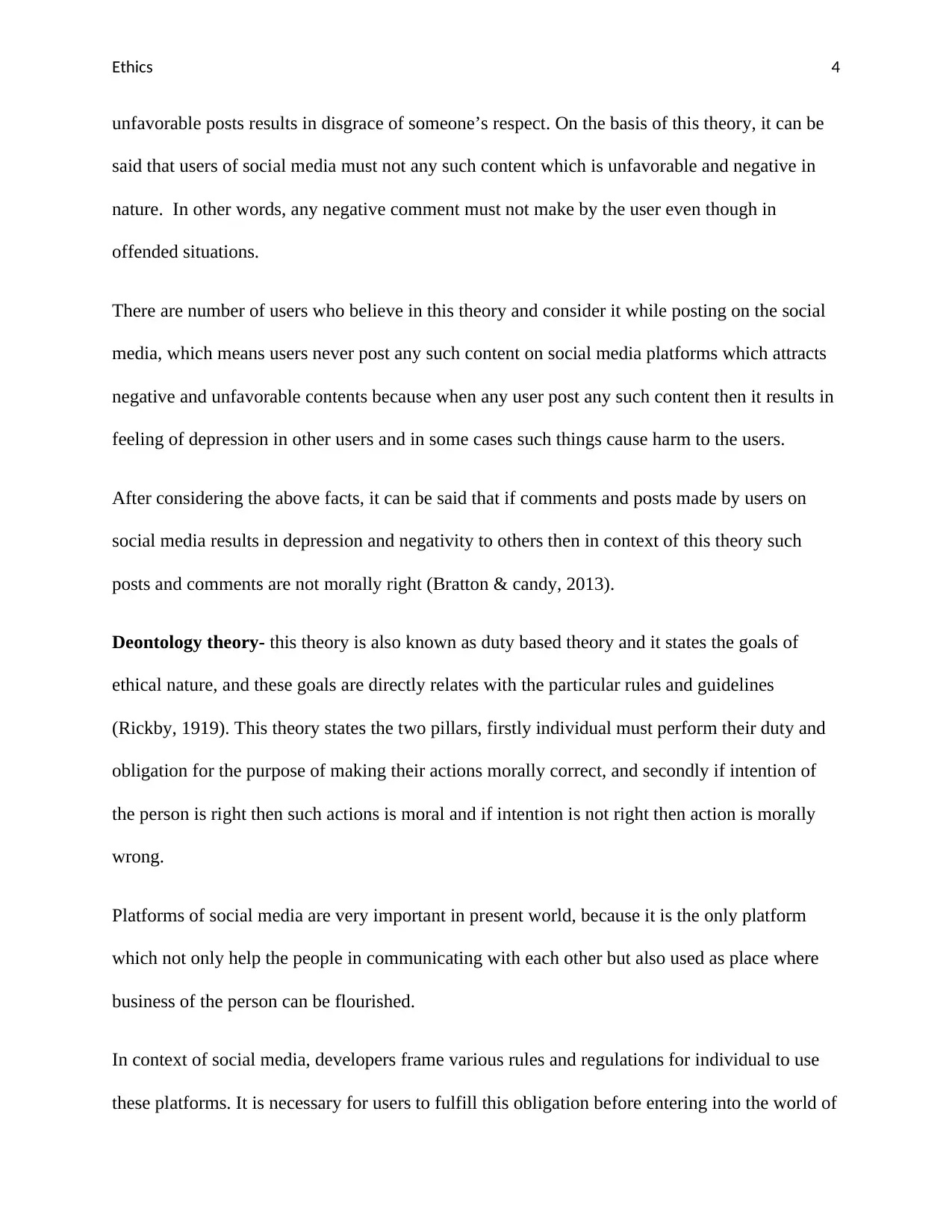
Ethics 4
unfavorable posts results in disgrace of someone’s respect. On the basis of this theory, it can be
said that users of social media must not any such content which is unfavorable and negative in
nature. In other words, any negative comment must not make by the user even though in
offended situations.
There are number of users who believe in this theory and consider it while posting on the social
media, which means users never post any such content on social media platforms which attracts
negative and unfavorable contents because when any user post any such content then it results in
feeling of depression in other users and in some cases such things cause harm to the users.
After considering the above facts, it can be said that if comments and posts made by users on
social media results in depression and negativity to others then in context of this theory such
posts and comments are not morally right (Bratton & candy, 2013).
Deontology theory- this theory is also known as duty based theory and it states the goals of
ethical nature, and these goals are directly relates with the particular rules and guidelines
(Rickby, 1919). This theory states the two pillars, firstly individual must perform their duty and
obligation for the purpose of making their actions morally correct, and secondly if intention of
the person is right then such actions is moral and if intention is not right then action is morally
wrong.
Platforms of social media are very important in present world, because it is the only platform
which not only help the people in communicating with each other but also used as place where
business of the person can be flourished.
In context of social media, developers frame various rules and regulations for individual to use
these platforms. It is necessary for users to fulfill this obligation before entering into the world of
unfavorable posts results in disgrace of someone’s respect. On the basis of this theory, it can be
said that users of social media must not any such content which is unfavorable and negative in
nature. In other words, any negative comment must not make by the user even though in
offended situations.
There are number of users who believe in this theory and consider it while posting on the social
media, which means users never post any such content on social media platforms which attracts
negative and unfavorable contents because when any user post any such content then it results in
feeling of depression in other users and in some cases such things cause harm to the users.
After considering the above facts, it can be said that if comments and posts made by users on
social media results in depression and negativity to others then in context of this theory such
posts and comments are not morally right (Bratton & candy, 2013).
Deontology theory- this theory is also known as duty based theory and it states the goals of
ethical nature, and these goals are directly relates with the particular rules and guidelines
(Rickby, 1919). This theory states the two pillars, firstly individual must perform their duty and
obligation for the purpose of making their actions morally correct, and secondly if intention of
the person is right then such actions is moral and if intention is not right then action is morally
wrong.
Platforms of social media are very important in present world, because it is the only platform
which not only help the people in communicating with each other but also used as place where
business of the person can be flourished.
In context of social media, developers frame various rules and regulations for individual to use
these platforms. It is necessary for users to fulfill this obligation before entering into the world of
Paraphrase This Document
Need a fresh take? Get an instant paraphrase of this document with our AI Paraphraser
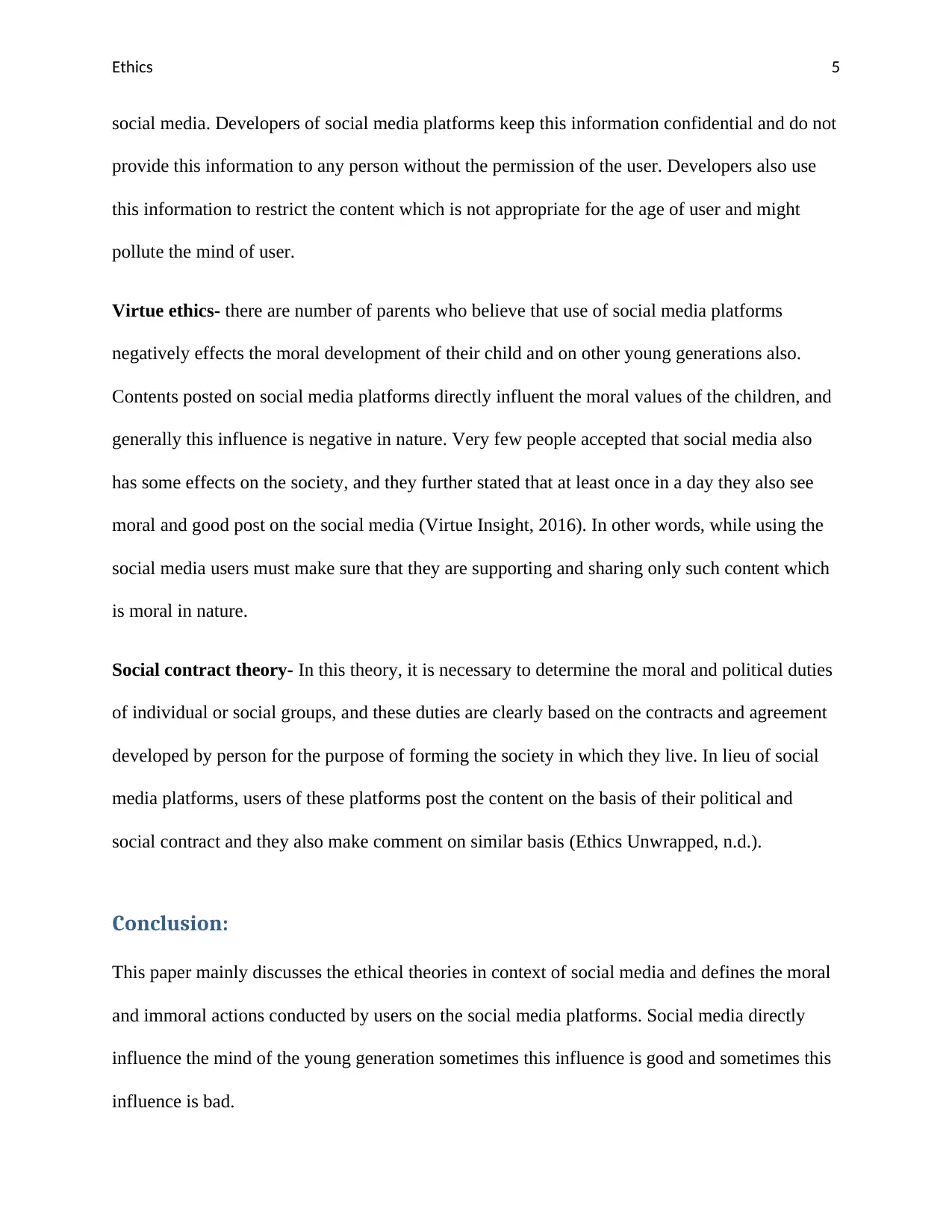
Ethics 5
social media. Developers of social media platforms keep this information confidential and do not
provide this information to any person without the permission of the user. Developers also use
this information to restrict the content which is not appropriate for the age of user and might
pollute the mind of user.
Virtue ethics- there are number of parents who believe that use of social media platforms
negatively effects the moral development of their child and on other young generations also.
Contents posted on social media platforms directly influent the moral values of the children, and
generally this influence is negative in nature. Very few people accepted that social media also
has some effects on the society, and they further stated that at least once in a day they also see
moral and good post on the social media (Virtue Insight, 2016). In other words, while using the
social media users must make sure that they are supporting and sharing only such content which
is moral in nature.
Social contract theory- In this theory, it is necessary to determine the moral and political duties
of individual or social groups, and these duties are clearly based on the contracts and agreement
developed by person for the purpose of forming the society in which they live. In lieu of social
media platforms, users of these platforms post the content on the basis of their political and
social contract and they also make comment on similar basis (Ethics Unwrapped, n.d.).
Conclusion:
This paper mainly discusses the ethical theories in context of social media and defines the moral
and immoral actions conducted by users on the social media platforms. Social media directly
influence the mind of the young generation sometimes this influence is good and sometimes this
influence is bad.
social media. Developers of social media platforms keep this information confidential and do not
provide this information to any person without the permission of the user. Developers also use
this information to restrict the content which is not appropriate for the age of user and might
pollute the mind of user.
Virtue ethics- there are number of parents who believe that use of social media platforms
negatively effects the moral development of their child and on other young generations also.
Contents posted on social media platforms directly influent the moral values of the children, and
generally this influence is negative in nature. Very few people accepted that social media also
has some effects on the society, and they further stated that at least once in a day they also see
moral and good post on the social media (Virtue Insight, 2016). In other words, while using the
social media users must make sure that they are supporting and sharing only such content which
is moral in nature.
Social contract theory- In this theory, it is necessary to determine the moral and political duties
of individual or social groups, and these duties are clearly based on the contracts and agreement
developed by person for the purpose of forming the society in which they live. In lieu of social
media platforms, users of these platforms post the content on the basis of their political and
social contract and they also make comment on similar basis (Ethics Unwrapped, n.d.).
Conclusion:
This paper mainly discusses the ethical theories in context of social media and defines the moral
and immoral actions conducted by users on the social media platforms. Social media directly
influence the mind of the young generation sometimes this influence is good and sometimes this
influence is bad.
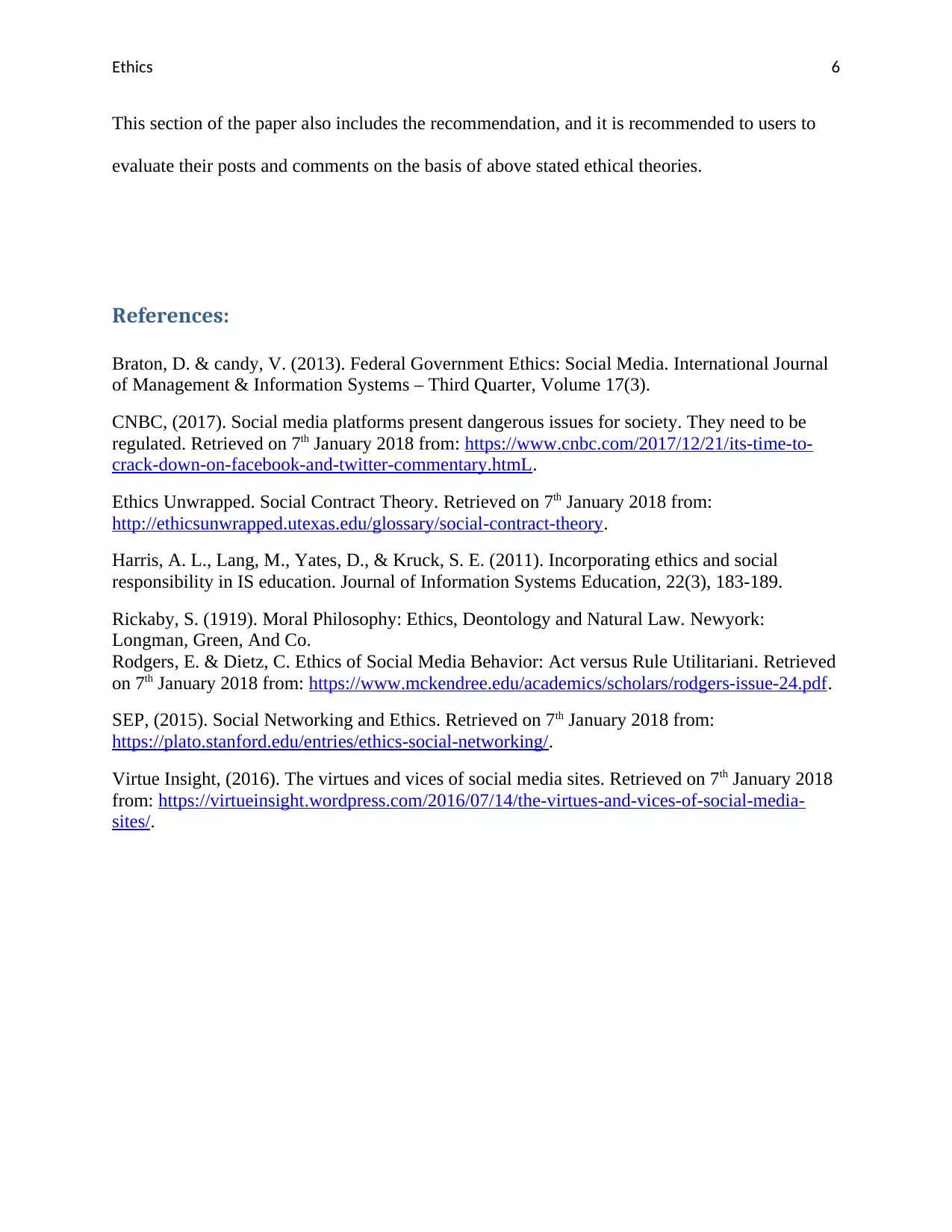
Ethics 6
This section of the paper also includes the recommendation, and it is recommended to users to
evaluate their posts and comments on the basis of above stated ethical theories.
References:
Braton, D. & candy, V. (2013). Federal Government Ethics: Social Media. International Journal
of Management & Information Systems – Third Quarter, Volume 17(3).
CNBC, (2017). Social media platforms present dangerous issues for society. They need to be
regulated. Retrieved on 7th January 2018 from: https://www.cnbc.com/2017/12/21/its-time-to-
crack-down-on-facebook-and-twitter-commentary.htmL.
Ethics Unwrapped. Social Contract Theory. Retrieved on 7th January 2018 from:
http://ethicsunwrapped.utexas.edu/glossary/social-contract-theory.
Harris, A. L., Lang, M., Yates, D., & Kruck, S. E. (2011). Incorporating ethics and social
responsibility in IS education. Journal of Information Systems Education, 22(3), 183-189.
Rickaby, S. (1919). Moral Philosophy: Ethics, Deontology and Natural Law. Newyork:
Longman, Green, And Co.
Rodgers, E. & Dietz, C. Ethics of Social Media Behavior: Act versus Rule Utilitariani. Retrieved
on 7th January 2018 from: https://www.mckendree.edu/academics/scholars/rodgers-issue-24.pdf.
SEP, (2015). Social Networking and Ethics. Retrieved on 7th January 2018 from:
https://plato.stanford.edu/entries/ethics-social-networking/.
Virtue Insight, (2016). The virtues and vices of social media sites. Retrieved on 7th January 2018
from: https://virtueinsight.wordpress.com/2016/07/14/the-virtues-and-vices-of-social-media-
sites/.
This section of the paper also includes the recommendation, and it is recommended to users to
evaluate their posts and comments on the basis of above stated ethical theories.
References:
Braton, D. & candy, V. (2013). Federal Government Ethics: Social Media. International Journal
of Management & Information Systems – Third Quarter, Volume 17(3).
CNBC, (2017). Social media platforms present dangerous issues for society. They need to be
regulated. Retrieved on 7th January 2018 from: https://www.cnbc.com/2017/12/21/its-time-to-
crack-down-on-facebook-and-twitter-commentary.htmL.
Ethics Unwrapped. Social Contract Theory. Retrieved on 7th January 2018 from:
http://ethicsunwrapped.utexas.edu/glossary/social-contract-theory.
Harris, A. L., Lang, M., Yates, D., & Kruck, S. E. (2011). Incorporating ethics and social
responsibility in IS education. Journal of Information Systems Education, 22(3), 183-189.
Rickaby, S. (1919). Moral Philosophy: Ethics, Deontology and Natural Law. Newyork:
Longman, Green, And Co.
Rodgers, E. & Dietz, C. Ethics of Social Media Behavior: Act versus Rule Utilitariani. Retrieved
on 7th January 2018 from: https://www.mckendree.edu/academics/scholars/rodgers-issue-24.pdf.
SEP, (2015). Social Networking and Ethics. Retrieved on 7th January 2018 from:
https://plato.stanford.edu/entries/ethics-social-networking/.
Virtue Insight, (2016). The virtues and vices of social media sites. Retrieved on 7th January 2018
from: https://virtueinsight.wordpress.com/2016/07/14/the-virtues-and-vices-of-social-media-
sites/.
⊘ This is a preview!⊘
Do you want full access?
Subscribe today to unlock all pages.

Trusted by 1+ million students worldwide
1 out of 6
Related Documents
Your All-in-One AI-Powered Toolkit for Academic Success.
+13062052269
info@desklib.com
Available 24*7 on WhatsApp / Email
![[object Object]](/_next/static/media/star-bottom.7253800d.svg)
Unlock your academic potential
Copyright © 2020–2026 A2Z Services. All Rights Reserved. Developed and managed by ZUCOL.





